Jazz bass icon and 6-string pioneer tells the whole story of going from New York to LA (and back!), worldwide touring, the Chick Corea gig and lots more!
Exclusive interview with FBPO’s Jon Liebman
September 13, 2010
Originally from Brooklyn, NY, John Patitucci began playing electric bass at age 10 and acoustic bass at age 15. As a teenager, John moved with his family to California, where he studied classical bass at San Francisco State University. In 1980, the Patituccis moved to Los Angeles, where John embarked on a long and successful career as a studio musician and jazz artist.
In 1985, John’s career was catapulted through his longstanding association with Chick Corea, with whom he toured and recorded for several years. John has performed and/or recorded with B.B. King, Bonnie Raitt, Herbie Hancock, George Benson, Dizzy Gillespie, Dave Grusin, Natalie Cole, Bon Jovi, Queen Latifah, Sting, Carly Simon, Stan Getz, Wynton Marsalis, Joshua Redman, Michael Brecker, Randy Brecker, Freddie Hubbard, Tony Williams, Hubert Laws, Mulgrew Miller, James Williams, Carole King and countless others. He has also performed with a great many Latin music artists, including Milton Nascimento, Astrud and João Gilberto, Airto and Flora Purim, Ivan Lins, João Bosco and Dori Caymmi.
John has won many awards and readers’ polls for his electric and acoustic bass playing, including the National Academy of Recording Arts and Sciences MVP on acoustic bass, “Best Jazz Bassist” in Guitar Player magazine’s 1992, 1994 and 1995 Readers’ Polls and “Best Jazz Bassist” in Bass Player magazine’s 1993, 1994, 1995 and 1996 Readers’ Polls. John’s recordings have brought him two Grammy Awards and over fifteen Grammy nominations. His first solo recording, John Patitucci, went to number one on the Billboard jazz charts.
John remains active as a composer and performer, with his own groups, as well as others. For the past ten years, he has been a member of jazz legend Wayne Shorter’s band. Patitucci is Associate Professor of Jazz Studies at City College in New York. He lives with his wife Sachi, a cellist, and their daughters.
FBPO: Let’s start with your musical upbringing.
JP: Well, my brother played the guitar, so first I wanted to play that. His teacher was making him learn how to read music. I’m left-handed. I play righty, but I’m still very left-handed.
FBPO: You’re a lefty? I didn’t know that.
JP: Yes. The pick felt really awkward in my right hand. I tried to do everything like my brother, because he was older. At the same time, though, I also had bongos and maracas and I was singing and playing percussion. I loved the drums, too. My brother saw me struggling, trying to take a little bit from his teacher and it wasn’t working out. I was probably around 8 or 9 at the time. So my brother suggested I try the electric bass. I wouldn’t have to use a pick and the instrument had fewer strings, so he thought maybe I would take to it. He was also probably thinking at the time that maybe we could play together.
So that’s what happened. We found a short-scale Telstar bass with La Bella flatwound strings that buzzed a lot because the bass was messed up. I loved it, though! I fell in love with it immediately. I was playing by ear, listening to the radio, all the Motown stuff, rock & roll, blues, the British invasion… you know, everything that was happening in the ’60s.
FBPO: Were your parents musical?
JP: They had nice ears and sang around the house, but they didn’t play anything.
FBPO: How did you end up with the upright bass?
JP: That was later on. Before my family left New York, my grandfather was on a job site in Manhattan one day, fixing the road, and somebody had hauled a couple boxes to the curb to get rid of them. Well, these two boxes had records in them. Later on, a good friend of mine, Steve Wilson, the great alto saxophone player, told me there had been a lovers’ quarrel and somebody’s records got put out on the street. Nobody would have thrown out these records, Jon.
FBPO: What were they?
JP: There was some Art Blakey & the Jazz Messengers, one record in particular called Mosaic, with Wayne Shorter and Freddie Hubbard. There were Wes Montgomery records with Ron Carter and Herbie Hancock and Grady Tate, some Jimmy Smith organ trio records, some Oscar Peterson with Ray Brown…
FBPO: What a find!
JP: All these records were in there. So my brother and I were pulling out these records and putting them on. I think it was the Wes Montgomery records that pulled us in because they were bluesy, soulful and just easy to connect with. The Art Blakey record really shook me, though. It was really emotional for me. I didn’t understand what they were doing, but the power and the intensity of it really grabbed me. So those were the seeds of jazz that came to me when I was pretty young.
FBPO: Is that what got you into the upright?
JP: Not yet. It wasn’t till after we’d moved to the West Coast, to the San Francisco area. I still hadn’t gotten a hold of an acoustic bass until the summer before high school, when I tried to fool around with it. I think I started to mess with it around sophomore year. I must have been around 15.
I’ve had a mentor named Chris Poehler since I was about 13 – great guy, great bass player, arranger and bandleader. He was getting his teaching credential at San Francisco State and he knew the band director of my 8th grade band. He started coming around and teaching me. He’s the one who made me learn how to read music because, up till then, I was playing by ear, completely. He got me interested in the acoustic bass and I got really into it. I was self-taught for a while until he had me go, during my first year of college, to study with Charles Siani, who was the principal bassist of the San Francisco Opera.
In 1978, my Dad’s work took him to L.A., so the family moved down there, except for my brother, who was old enough to stay behind in the Bay Area. I’ve always appreciated how my brother was my first teacher and trailblazer for my musical career. When we got to the L.A. area, I went to Long Beach State for two years and I studied with Abe Luboff, who was a former bassist in the L.A. Philharmonic. He used to do a lot of studio work, playing on all the movies, including Jaws. He really wanted me to be a classical bass player. I was working really hard at it, but I was also playing in a lot of jazz groups and funk and lots of other music. In L.A., there was a big emphasis on studio playing, groove, electric bass, playing of a lot of genres that had to do with pop and songwriters and singing. The music was more commercial-oriented, but I was still pursuing my jazz, as well. I was trying to learn all these skills. I was also playing on a lot of Christian records, R&B, gospel music and all kinds of stuff.
For the first two years there, I was going to school and playing a lot of bebop gigs at night and doing all this stuff, living with my parents in Huntington Beach and going to school at Long Beach State. And then I quit school, which really upset my classical professor, who had wanted me to be a symphonic bass player. I just bailed on the whole thing and started going on the road with different groups.
FBPO: Who’d you go out with?
JP: I started touring with Gap Mangione, Chuck’s brother, who’s a pianist. That was around the summer of ’79. That’s when I realized I didn’t want to go back to school and I quit. I wanted to travel, I wanted to play, I wanted to learn, I wanted to practice. I was still pretty young and I didn’t want to just set my sights on practicing really hard and getting a chair in a symphony orchestra. It’s ironic that now I play way more classical music now than I used to. In 1982, I moved to Van Nuys and started playing with the old bebop guys and playing funk and fusion stuff, playing Brazilian music, playing for the movies and just starting to play sessions.
FBPO: You must have come into contact with the contractors and producers and all of those kinds of people.
JP: What I did was all word of mouth through the players. I started getting these gigs, like with Joe Farrell and Airto and Flora Purim. I played with Moacir Santos and Oscar Castro-Neves. These people talked to other people. They were involved and very connected in L.A.
I started playing in Victor Feldman’s trio and that was a big deal because he told Chuck Domanico about me, the famous studio bassist. And Chuck started talking about this little Italian kid who reminded him of himself. I went to see him play with Shelly Manne one night to thank him. We went upstairs on the break and we talked for about an hour and he said, “Okay, you’re playing the second set!” So he heard me play with Shelly Manne. Roger Kellaway was playing piano.
Chuck started referring me for more stuff. Victor helped, too. I was playing with a lot of different people. I was playing at Carmelo’s and Dante’s with all the beboppers and doing studio work and making inroads as much as I could. I played with Larry Carlton’s band. I played with a lot of different people at the Baked Potato and doing that whole scene, so I was playing a lot of electric, as well.
FBPO: I remember when you came down to Miami in 1985 with Chick.
JP: Chick was a huge turning point. That was a gig I really wanted.
FBPO: How did you get it?
JP: I’d been working with Joe Farrell and Joe had been with him for quite a while. I kept asking Joe if Chick ever had auditions because I really wanted to have a chance to play with Chick. I know he could use somebody who plays both instruments because he plays in a lot of different styles. Stanley (Clarke) was the first guy I ever saw who did all that and I thought this would be natural for somebody like me. So, when I was playing with Victor Feldman’s trio, I wound up playing at Chick’s house one night because Chick and his wife Gayle used to have Valentine’s Day parties every year and they would have people to their house and a bunch of people would play. There’d be all these desserts and it was a really nice hang.
So they invited Victor Feldman’s trio to come and play a little bit and there I was in Chick’s living room playing! He came up to me afterwards and asked if I also play electric bass because he was thinking of starting this electric group. And I said sure, that was my first instrument. I actively play both. He asked me to send him some recordings of me playing the electric and I sent him a record I was on with Clare Fischer and some live takes from the tapes from the Baked Potato, along with some other things. A few days later I was at a studio doing a record for somebody and the engineer, who was a prankster, said, “Hey, John, Chick Corea’s on the phone.” I thought he was putting me on. So I went to the phone and, sure enough, it was Chick and he said, “I know you’re really busy, but I was wondering if you’d consider joining my group.” I said, “Are you kidding? When do we start?!”
FBPO: I asked Victor Bailey, who played with Weather Report, and Gerald Veasley, who later played with Joe Zawinul, how they felt about stepping into Jaco’s shoes in their respective roles. Finding yourself in a comparable situation, did you feel at all inhibited stepping into Stanley’s shoes?
JP: It was a little different for me. I had it easier than they did because Victor in particular was literally stepping into Jaco’s shoes. He followed him. I didn’t follow Stanley with respect to the fact that Stanley had been long gone by that point. However, yes, I felt intimidated by the long line of Corea bassists. It wasn’t just Stanley. It was people like Eddie Gomez and Miroslav Vitous. Before me, I think it was Bunny Brunel. But that was a totally different style from me, so I didn’t feel much pressure.
FBPO: There seemed to be a real connection with you and Chick and Dave (Weckl) and Frank (Gambale)…
JP: Yeah, that was a huge thing! It just happened. Actually, I didn’t know Dave at all. I was in L.A., so I was playing with Vinnie Colaiuta and all these guys. And I got the gig before anybody was really firmly chosen. Chick had been hearing about Dave from Mike Brecker and, actually, for the first couple of things we did in L.A., Tommy Brechtlein played because he had been in the group before, with Chick.
So I was saying to Chick, Wow, who’s going to play drums? Let’s get Vinnie Colaiuta, because I hadn’t met Dave yet. I’d heard a little bit about him because Dave Garfield had said there’s this guy from St. Louis named Weckl. He’s in New York and he’s killing. Chick had heard about him, too. He said, “Don’t worry, I’ve got a drummer, this kid from New York, Dave Weckl. Mike Brecker said he’s the best young drummer in New York.” So Dave came out and we rehearsed and we had fun playing. It was like an instant hook-up.
FBPO: You’re considered to be one of the pioneers of the six-string electric bass. How did you get into playing the six-string?
JP: Well, it’s interesting. Obviously, Anthony Jackson would be the first guy. There were some guys that came after him, like Bill Dickens and some of these other cats, but Anthony, to me, was the guy that made me interested in checking it out because he was the true pioneer. He was the guy who made the luthiers build them. At the time, they were all saying, “That’s crazy! You’re going to get tendonitis, you’re going to kill yourself, the neck’s too wide, blah, blah, blah…”
I think the first guy he talked into making one was Carl Thompson. Carl made various instruments. Then he finally got Ken Smith to make those. And actually, Vinnie Fodera was making a lot of those instruments, working for Ken. Vinnie Fodera made the bass that I would wind up getting. I got with Yamaha in the late ’80s, which was really exciting because they were willing to work with me and allow me to have a say in how the instruments were made. And that was a huge thing in terms of me really making the six-string a personal voice. I was thrilled! At the time, I was touring so much with Chick and many people were seeing the six-string bass for the first time. But really, Anthony deserves the credit because without him I would have never known that it was possible.
I wound up spreading it around quite a bit. It certainly wasn’t a plan of mine. I just fell in love with it because it matched where I was going, finding my way of playing, trying not to copy Jaco and not to play the fretless jazz bass, even though I love that sound. There were so many guys doing that and I didn’t want to copy them. I was also trying not to be a clone of all the slap guys that I loved, too. There were so many guys using the jazz bass for slapping. Then Marcus (Miller) emerged as finding his way of doing that, post-Larry Graham and all these guys, finding his own personal voice with that. So for me, the six-string became a way to not only play the bottom foundational role of bass playing, but also have that high string for the blowing because of my jazz sensibilities. It became a really interesting and fertile time for me to grow and experiment. Chick took me around the world and I had a lot of time to practice and we played hundreds and hundreds of gigs every year.
FBPO: Having done some of your growing up on the West Coast, you were already around the scene where there was a lot happening, musically. How would you advise the young wannabe players who have their sights set on breaking into the music scene in L.A. or New York, especially given how much things have changed in the last twenty years?
JP: I was fortunate to come back to New York as an established artist. I see my students and young people trying to break in here and it’s much more difficult if you’re strictly an electric bass player in New York because the session scene does not exist here like it did in the ’70s. If you’re strictly involved in the styles of just R&B-ish bass music or rock and pop styles on the electric bass, I don’t think you can come here and have an easy road breaking into a studio scene because there’s not so much of that here in New York.
FBPO: What about for someone who doubles on upright?
JP: You’re chances are better, but to get into the recording scene, I’m not even sure any more. In L.A. there’s more in the commercial recording scene. There are still more movies done there and there are probably more jingles done there, but even that is not what it used to be. That’s more of an electric town, in my view. By far.
FBPO: You’ve been all over the world. It’s often said that the audiences in Europe seem to be more appreciative of jazz. Do you find that to be the case?
JP: In general, yes. I just got back with Wayne Shorter’s quartet, with Brian Blade and Danilo Perez. We did a few gigs in France and Italy and those audiences are very knowledgeable about the music and very passionate about the it. Also in South America, you’ve got some audiences like that. Germany has a history of jazz festivals, too. Sweden has some jazz festivals. There’s definitely some stuff in Switzerland. Norway has some festivals. Then of course there’s the North Sea Festival in Holland.
FBPO: How would you compare those to, say, Playboy and Newport and the other ones that we have here?
JP: With all respect to the American festivals, I’d have to say that the European festivals were always way more jazz oriented, especially when you look at the long track record of when I started going over there in the ’80s. The festivals here have become a lot more pop oriented, but the same thing has been happening in Europe lately, too.
FBPO: John, what’s been keeping you busy these days? What have you got going on?
JP: I’m still very active with Wayne Shorter’s band. It’s ten years now we’ve been playing together. That’s a very cutting-edge kind of group for me. I enjoy it a lot.
I toured with a trio over the last year or so after my Remembrance record came out. The band on the record was Joe Lovano and Brian Blade. We did a week at Dizzy’s in New York and it was packed. Then we did a big performance at the Monterey Jazz Festival out in California. Brian and I did a quartet gig out there at Monterey with Lovano and (John) Scofield, which was phenomenal. Scofield actually stepped in at the last minute because Hank Jones — God bless him, he’s not with us any more — was supposed to do the gig. I was pursuing some stuff to promote my record.
Sometimes I do stuff with Scofield. Every once in a while there are little projects that we do together. I’ve done some stuff with Herbie Hancock like that, too, on a project basis. But my primary commitment is with Wayne. I’ve done a couple little reunion things with Chick over the last decade, as well.
FBPO: You’ve always done a lot of writing, too. Do you have anything new you can tell me about?
JP: Well, I keep writing for larger forums. I also shed a lot and practice. There’s a great composer from England named Mark-Anthony Turnage, who wrote a beautiful piece for Scofield called “Scorched,” which was for full orchestra, plus (Peter) Erskine, Scofield and me. We’ve been doing that piece for a bunch of years. Through that association, he wrote me a cool concerto that we did in Europe quite a bit. We also did it with the St. Louis Symphony Orchestra. That was really enjoyable. That concerto was written for the double bass and the six-string bass, two movements for each. That was fun. It inspired me to write some more stuff for larger forums. With the six-string bass, there are fewer balance issues with the orchestra than there are with the acoustic bass. So I wrote a piece for the six-string bass with string orchestra plus woodwinds and French horn, basically a chamber orchestra. I haven’t had that performed yet, but I’d like to get that done.
FBPO: You’ve already accomplished so much in your career, yet you’re still pretty young and have a lot of energy. What else would you like to do that you haven’t done yet?
JP: There are a lot of projects I’d like to do. I felt like I was getting stereotyped in L.A. My upright and jazz playing is pretty well established, so I’d like to keep doing that, but I’d like to do more with the electric bass, too. I’m still really fascinated by combinations of the folkloric element, the African grooves, the South American grooves on the six-string bass, mixed with the harmonic and linear elements of jazz. I still want to do more of that. And I am working on that.
I’ve talked with Brian Blade about doing a roots record at some point, where we’ll just do stuff that’s related to the blues part of my roots, where I’ll play a bass with flatwound strings the whole time [laughs]. But then tie it in somehow with some of the other stuff that I do, but do it really tastefully and with respect for that tradition.
FBPO: That’s a lot that we can look forward to. I hope you get to all of that stuff and more.
JP: There’s a lot of classical stuff I’d like to do, too.
FBPO: What sort of things do you like to do that aren’t necessarily musically oriented?
JP: I’m a Yankee fan! And that’s happened just since I’ve been back. When I was a kid I was a Met fan because I came from Brooklyn.
FBPO: I hope you’re enjoying Curtis Granderson.
JP: I love him! He’s great!
FBPO: Well, we’re enjoying Johnny Damon, so thanks for the swap.
JP: As you should! Both of those guys are real gentlemen and great examples for the kids.
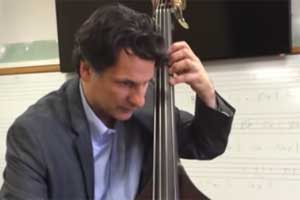
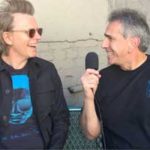
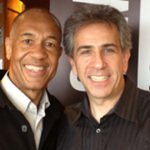
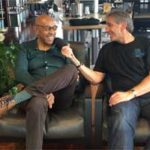
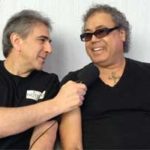
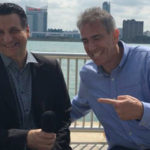

Wow. Superb blog!
I met Pat after an Elektrik Band gig back in 1991.
He was a total gentleman.
Thank you for posting this wonderful interview